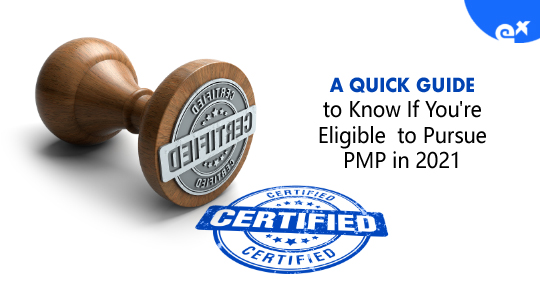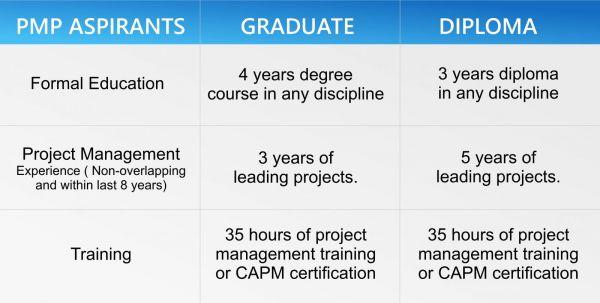
The PMP Certification is a standard for evaluating a project manager’s abilities. It is governed by the Project Management Institute (PMI)® and is widely recognized all over the world. PMP Certification is acknowledged by all types of industries and certified project managers are always in high demand.
Why should I opt for PMP Certification?
PMP Certification offers several benefits to you as an individual, your career, and the organization you work for.
Some of the main benefits are as follows:
- Increase in your versatility and broadening of your skill sets.
- The certification will help you further your career by allowing you to apply for better jobs in the world’s most prestigious firms.
- PMP certified resources benefit the organisation by managing internal or client’s projects using world-class project management tools and practises.
Certification Eligibility Criteria
To become certified, a person must have the necessary knowledge and abilities to manage project lifecycles in any industry.
PMI has established eligibility criteria in three areas: education, experience, and training.

Why is there eligibility criteria?
PMP is one of PMI’s top-tier qualifications, with widespread acceptance across many industries. The strict eligibility criteria and arduous certification exam that the aspirant must pass are the reasons why PMP is rated so highly.

Project management is a serious profession that necessitates communication with a variety of stakeholders at all stages of the project’s life cycle. The management team looks up to the project manager to guarantee that the implementation is completed on time, on budget, and meets the business objectives. This necessitates the project manager to be knowledgeable about all aspects of business while delivering a scope of work and be aware of stakeholders’ expectations by putting an emphasis on communication management.
Otherwise, the project’s completion may be jeopardised. Therefore, one of the most important qualifications for PMP certification is a solid project management experience.
A PMP certified professional must have a strong theoretical understanding of project management approaches. One has to be proficient in 10 knowledge areas within 5 process groups of the PMBOK. It is critical to complete the required contact hours of training in order to grasp the concepts and pass the PMP certification exam.
The education qualifications demonstrate that the candidate possesses sufficient theoretical knowledge to handle projects. The training criteria ensure that the applicant understands the PMI project management methodology. The experience criteria prepares the candidate for the workplace and aids in the application of principles to real-world projects.
Do meeting eligibility criteria ensure certification?
No, not at all. The only qualification criterion is that you take the certification exam. Passing one of the most difficult tests is a tremendous struggle. However, the importance of meeting the eligibility criteria cannot be understated, since it demonstrates your competency to manage projects. PMP certification demonstrates that your project management knowledge is of high quality and current.
Meeting eligibility requirements motivates you to improve your knowledge and skill sets in order to effectively manage projects. The eligibility criteria provide the foundation for pursuing PMP certification. Your eligibility aids you in relating the PMI method of project management to the method you have been using up to this point. In certain ways, your PMP eligibility sets you apart from other project managers who aren’t certified.
What if I am not eligible?
It’s fine if you don’t meet the requirements for PMP certification. You can also pursue another PMI-recognized certification, CAPM ( Certified Associate in Project Management). PMI offers the CAPM certification as an entry-level project management credential. The exam substance is identical to that of the PMP certification exam, however the questions are easier and the eligibility criteria are less stringent. CAPM is an important certification that will set you apart in the job market and increase your credibility and effectiveness when working with project teams.
What should I do next if I am eligible?
Now that you’ve met the requirements for PMP certification, you should try to complete it within a fair amount of time. Set a deadline for obtaining the PMP badge and work backwards to finish your training, preparation, and mock tests well before the exam date. You might simply begin your training with a reputable authorised training partner, get 35 PDUs, and then move on.
Frequently Asked Questions
1.Can I apply for the PMP Exam if I am not a project manager?
Ans: It makes no difference what your work title is. Only 4500/7500 hours of project management experience is required. You should have worked as a project manager or handled entire or parts of projects.
2.Can I use my projects in any industry for my PMP eligibility?
Ans: Yes. The project management experience is industry independent. The PMI project management principles apply to various types of projects, including those in construction, software, healthcare, and community service, among others.
3.Is PMP certificate only for IT Professionals?
Ans: Not necessarily. Though many IT professionals pursue PMP certification, it may be pursued by anyone who wants to improve their project management skills and become the best in class project manager by earning the PMP badge. It is not limited to a single domain.
4. Can I apply for the PMP exam if I only have experience of managing operations?
Ans: Project management differs from operations management in that operations are repeatable, whereas projects are one-time and have a set start and end date. PMI needs project management experience. Check if you’ve done any process improvements, infrastructure upgrades, or other tasks that could be considered as projects and count toward your project management experience while managing only operations.
5.Can I apply for the PMP exam if I am a CAPM?
Ans: One must meet the eligibility requirements to appear for the PMP exam.If you have a valid CAPM certification, you don’t need to take the 35-hour project management training. Even if you are CAPM certified, you must still meet the education and experience requirements.
6.Last year, I completed 35 contact hours of training. Since then, the PMBOK guide edition has changed. Can I apply for the current exam using my contact hours from last year?
Ans: As long as the contact hours from the previous year are still valid, you can use them. PMI has changed the exam pattern as of January 2, 2021, and it now follows the PMI.org exam content outline.
Despite the fact that PMI released the 7th edition of the PMBOK in the middle of this year, the PMP exam will continue to be based on the above content.
7.My bachelor’s degree programme included project management. Can I use this education for applying to the exam?
Ans: Since you have obtained a bachelor’s degree, you fulfil the education requirement for the PMP exam. Your university project management studies will undoubtedly aid you in comprehending the concepts and best practises that PMI follows. However, you must complete 35 contact hours of training and have three years of project management experience.
8.When and how does PMI verify my academic credentials and project management experience?

Ans: Your application will be reviewed by PMI in about 5 working days. A certain percentage of applications are checked for eligibility, such as formal education, work experience, and 35 contact hours. If your application is selected for an audit, PMI will contact you to request the necessary supporting documents.
- Photocopies of your diploma or degree certificate of completion.
- Managers’ or supervisors’ signatures on experience verification forms for projects submitted in the PMP application form’s experience section.
- Photocopies of certificates or letters from the training institute supporting the 35 contact hours requirement.





















